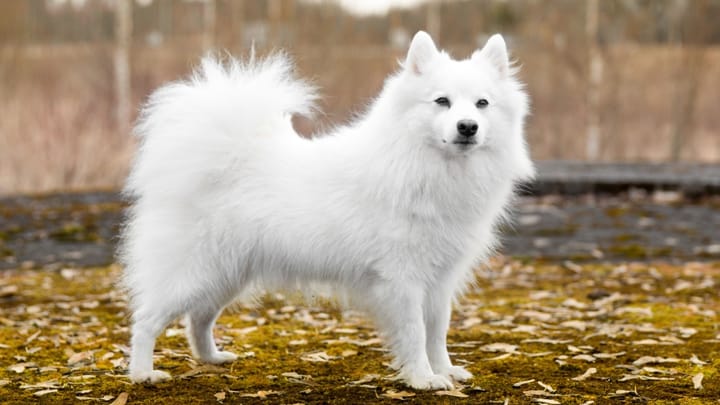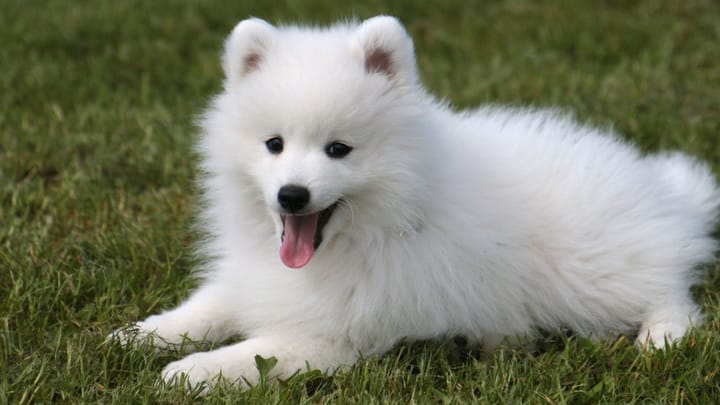Japanese Spitz


The Japanese Spitz is a small dog with a square body, deep chest, short legs, and a distinctive white fluffy coat. Created in 1930 by breeders who crossbred different types of Spitz dogs, the Japanese Spitz is a loyal and friendly companion dog. Despite its small size, the Japanese Spitz is known for its courage and bravery, making them an excellent watchdog for people living in flats or smaller houses. The Japanese Spitz is a very social dog with a genuine fondness for children of all ages.
|
Life expectancy |
The Japanese Spitz has a life expectancy of between 12 and 14 years |
|
Temperament |
|
|
Size |
Small
|
|
Adult size |
Female
Between 11 and 14 in
Male
Between 12 and 15 in
|
|
Adult weight |
Female
Between 13 and 22 lb
Male
Between 13 and 22 lb
|
|
Coat colour
A Japanese Spitz will always have a brilliant white coat. |
White |
|
Type of coat
These dogs have long outer coats and a thick, insulating undercoat. Long and double-layered. |
Long |
|
Eye colour
Black/dark brown. |
Brown
|
|
Purchase price |
The Japanese Spitz costs between £645 and £770 |
Japanese Spitz are generally very obedient, although they can have their stubborn or moody periods.
They will require a lot more grooming than most other dogs, which can be expensive and time-consuming.
They also have one of the longest lifespans of any breed, with many living up to 16 years old. This is a serious commitment by anyone's standards.
More details about the Japanese Spitz
Japanese Spitz: Origins and history
The Japanese Spitz was breed from the much larger white German Spitz breeds and was first exhibited at a Japanese dog show in 1921. The final standard breed was accepted by kennel clubs in the 1950s, and it wasn't long before the Japanese Spitz became a popular companion dog for animals lovers in many parts of the world. As of today, the Japanese Spitz is not the most popular choice for UK dogs owners, but their numbers are gradually increasing as the British public become more aware of this playful breed with a big personality.
Physical characteristics of the Japanese Spitz
The Japanese Spitz is a small, sturdy dog with a unique white coat that requires lots of grooming. They have short, pointed muzzles and triangle-shaped ears that point upwards. They also have long tails that tend to curl back on themselves, an unusual trait in Spitz breed. They have dark eyes and small, black noses.
FCI classification of the Japanese Spitz
-
Group 5 - Spitz and primitive types
-
Section 5 : Asian Spitz and related breeds
Japanese Spitz: Characteristics
Japanese Spitz: Behaviour
Training a Japanese Spitz
As long as you use the right techniques, most Japanese Spitzs will be very easy to train. But keep the training sessions short and fun. Otherwise, you’ll have a difficult time keeping the dog focused on the task at hand. 10-15 minutes a day is enough to start with. And make sure you give them lots of praise.
Japanese Spitz: Lifestyle
Breed compatibility Japanese Spitz
Japanese Spitz: Purchase price
The average cost of a purebred Japanese Spitz is somewhere between £645-£770.
These small dogs don't need massive amounts of food, but you’ll need to budget around £30-40 a month for feeding cost. Yearly health checks, vaccinations, insurance, and other costs will add to an annual expense of around £700 per year.
Japanese Spitz: Shedding
Light
This breed will shed a lot, particularly during the autumn and spring.
Japanese Spitz: Grooming
A Japanese Spitz has a long, thick coat that needs brushing at least once a week. Some will even require daily attention! They will also need to visit a professional groomer a few times each year. Otherwise, you'll need to learn some dog grooming skills. If left untreated, their thick dense coats will become matted, dirty, and very unhygienic.
Japanese Spitz: Health
The average lifespan for a Japanese Spitz is between 10-14 years.
These dogs might be small, but they're still pretty tough. They have well-balanced and well-proportioned frames, with small but sturdy legs. These little guys are much more resilient than they look.
The Japanese Spitz was not designed for warmer climates, and they're at risk of overheating during hot periods of weather. In the case of a long, hot summer, it's worth keeping their coats short and try to avoid intense walkies during the hottest parts of the day.
The Japanese Spitz has no problem dealing with the average British winter. They’re relatives of the Husky and the Akita and have inherited the same kind of insulating coat that protects their distant cousins from some of the coldest temperatures on earth.
Their active natures and relatively small appetites mean they fairly resistant to gaining unwanted weight.
- Patellar Luxation
- Tracheal collapse
- Hip Dysplasia
- Cataracts
- Eye infections
- Allergies





